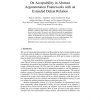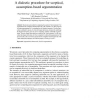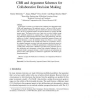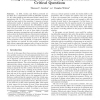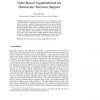123
click to vote
COMMA
2006
15 years 3 months ago
2006
The hitherto most abstract, and hence general, argumentation system, is the one described by Dung in a paper from 1995. This framework does not allow for joint attacks on arguments...
119
click to vote
COMMA
2006
15 years 3 months ago
2006
In this paper two formal dialectic systems are described, a persuasion protocol (PP0) and a negotiation protocol (NP0), together with a method for shifting from an instance of a pe...
101
click to vote
COMMA
2006
15 years 3 months ago
2006
We present a procedure for computing the sceptical "ideal semantics" for argumentation in assumption-based frameworks. This semantics was first proposed for logic program...
137
click to vote
COMMA
2006
15 years 3 months ago
2006
In this paper we present a novel approach for combining Case-Based Reasoning (CBR) and Argumentation. This approach involves 1) the use of CBR for evaluating the arguments submitt...
128
click to vote
COMMA
2006
15 years 3 months ago
2006
Abstract. In 2005, Gordon and Walton presented initial ideas for a computational model of defeasible argument [12, 26], which builds on and elaborates Walton's theory of argum...
126
click to vote
COMMA
2006
15 years 3 months ago
2006
Abstract. This paper presents our efforts to create argument structures from meeting transcripts automatically. We show that unit labels of argument diagrams can be learnt and pred...
144
click to vote
COMMA
2006
15 years 3 months ago
2006
In this paper we discuss the integration of two systems that are based on a specific theory of argumentation: the first, an existing web-based discussion forum; the second, a metho...
109
click to vote
COMMA
2006
15 years 3 months ago
2006
Abstract. This paper presents a coherentist approach to argumentation that extends previous proposals on cognitive coherence based agent communication pragmatics (inspired from soc...
158
click to vote
COMMA
2006
15 years 3 months ago
2006
Hierarchical argumentation frameworks organise Dung argumentation frameworks into a hierarchy so that argumentation over preference information in a level n Dung framework is used ...
